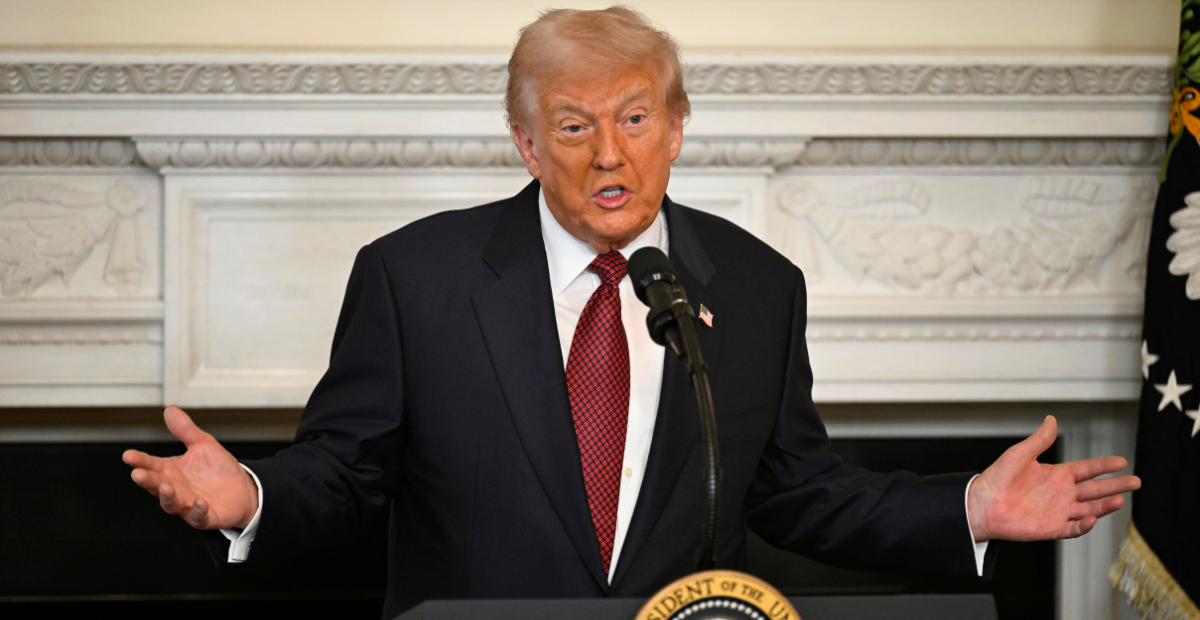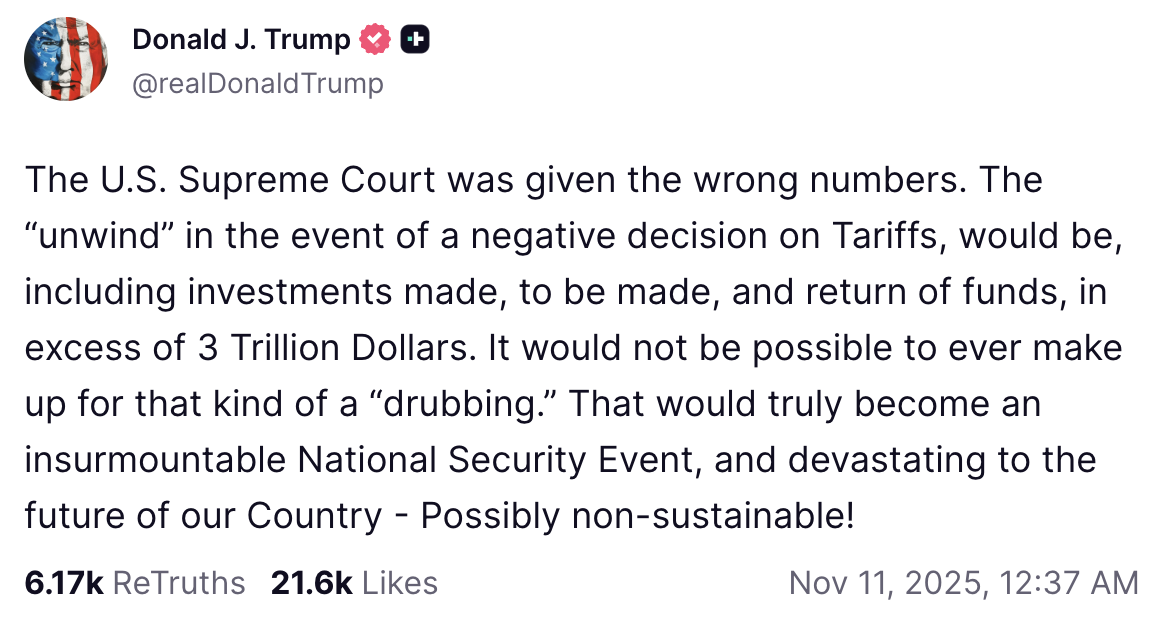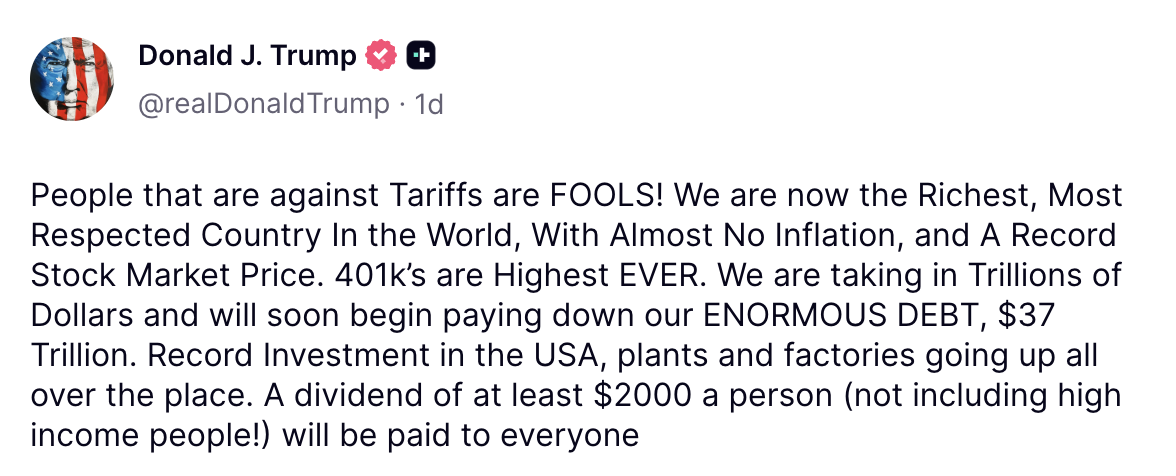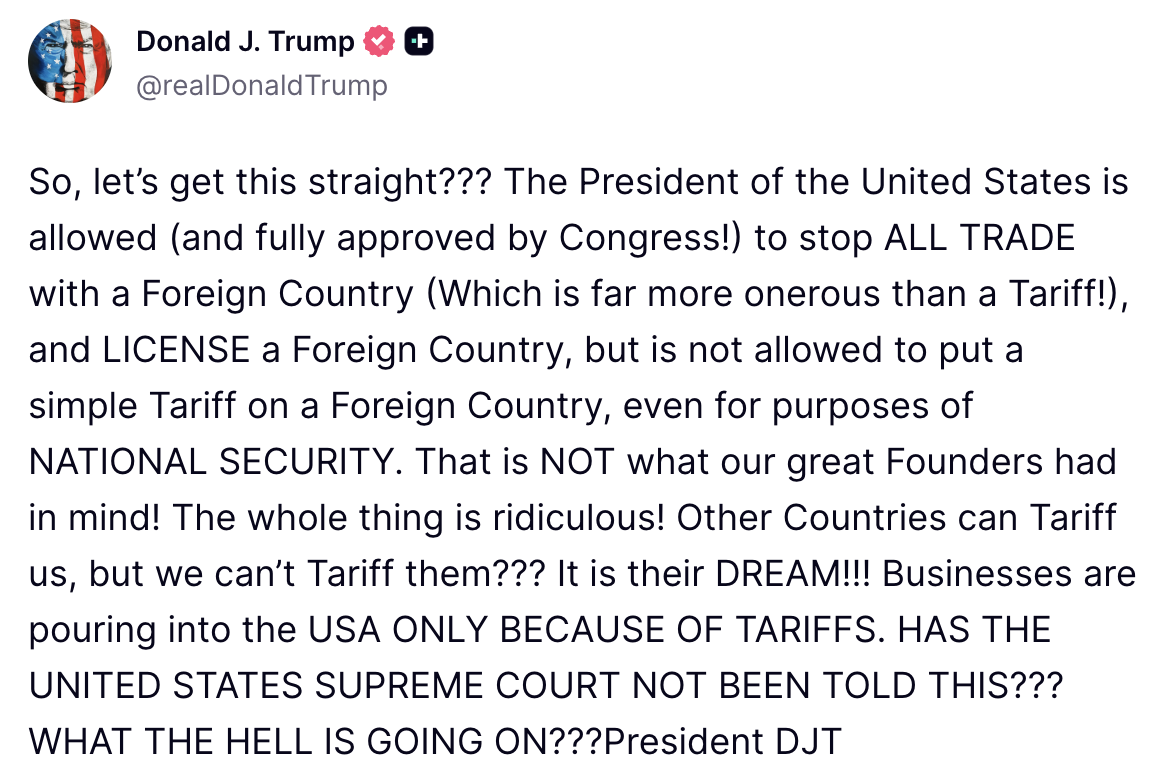Trump Says Every American Will Receive A $2,000 Dividend… Or Will They?
on Nov 10, 2025 • Updated Feb 23, 2026

This article was updated on Monday, Feb. 23, 2026.
Supreme Court Rules Against Trump’s Tariff Policy, Placing Chance Of Tariff Dividends On The Rocks
Back on Nov. 9, 2025, President Donald Trump announced in a Truth Social post that there would be tariff dividends for every American, but the prospect of those payments seems uncertain after the Supreme Court’s ruling today, Feb. 20.
In his initial post, Trump said, “A dividend of at least $2,000 a person (not including high income people!) will be paid to everyone.”
He added that “people that are against Tariffs are FOOLS,” going on to say that the reported trillions of dollars being brought in from his administration’s contentious tariff policy would begin paying down the $37 trillion national deficit.
However, there were little to no details shared on the realization of this payment to the American people.
Further, the chance that the Supreme Court would rule against Trump’s tariff policies posed a threat to the tariff dividend payments being issued from the start.
On Friday, Feb. 20, the Supreme Court made its decision on the legality of Trump’s controversial “reciprocal” tariff policy.
In a ruling of 6-3, the Supreme Court ruled against Trump’s implementation of the International Emergency Economic Powers Act to impose tariffs on other nations to counter trade deficits.
“The Framers did not vest any part of the taxing power in the Executive Branch,” wrote Chief Justice John Roberts in the ruling, noting that such power is granted to Congress, instead.
Back in November of 2025, Trump posted on Truth Social concerning what he believed a negative ruling on his tariff policies would mean for the nation, writing:

During a press conference on Feb. 20, Trump announced he was instating a new global 10% tariff, arguing that the new tariffs imposed could bring in more revenue than his previous tariff policy.
Similarly, the potential of refunds being issued amicably by the Trump administration is not on the table, with Trump noting refunds could be litigated in lower courts for years.
Notably, Justices Samuel Alito, Clarence Thomas, and Brett Kavanaugh dissented against the Supreme Court’s decision, with Kavanaugh writing, “The tariffs at issue here may or may not be wise policy. But as a matter of text, history, and precedent, they are clearly lawful.”
Continuing, Kavanaugh wrote, “The Court says nothing today about whether, and if so how, the Government should go about returning the billions of dollars that it has collected from importers. But that process is likely to be a ‘mess,’ as was acknowledged at oral argument.”
Regardless of his backup plan, this ruling against the Trump administration’s tariff policy is a significant blow to his economic vision for the country.
The decision also comes as Trump is set to make the first State of the Union Address of his term as the 47th president on Tuesday, Feb. 24.
Trump Calls Supreme Court Decision On Tariffs A “Disgrace”
Holding a press conference a matter of hours after the Supreme Court’s Feb. 20 ruling regarding Trump’s emergency powers for instating reciprocal tariffs, Trump decried the decision.
“The Supreme Court’s ruling on tariffs is deeply disappointing, and I’m ashamed of certain members of the Court — absolutely ashamed — for not having the courage to do what’s right for our country,” Trump started, proceeding to congratulate Justices Alito, Thomas, and Kavanaugh for being the three outliers in the 6-3 decision.
Continuing, Trump said, “Foreign countries that have been ripping us off for years are ecstatic, they’re so happy, and they’re dancing in the streets, but they won’t be dancing for long.”
He went on to criticize “the Democrats on the Court,” likening the independent judges to Democrats elected to serve as such in Congress, saying, “They’re against anything that makes America strong, healthy, and great again. They also are a disgrace to our nation, those Justices.”
Trump went on to claim, “It’s my opinion that the Court has been swayed by foreign interests in a political movement that is far smaller than people would ever think.”
When he was asked if he had evidence of this alleged foreign influence, Trump replied, “You’re gonna find out.”
Proceeding to speak on the significance of the Supreme Court case regarding tariffs, Trump said, “This was an important case to me, more as a symbol of economic national security.”
From there, Trump defended his tariff rates imposed on other nations, saying they were “modest” and designed to “effectively utilize tariffs over the past year to make America great again.”
Pointing to the effectiveness of the tariff policy, he said the policy led to the resolution of five of the eight wars that the Trump administration ended. Trump also drew attention to the use of tariffs against nations responsible for the influx of fentanyl and other illicit drugs.
In light of not being able to proceed with reciprocal tariffs, even bringing in as little as $1, Trump announced, “Today, I will sign an order to impose a 10% global tariff under Section 122, over and above our normal tariffs already being charged, and we’re also initiating several Section 301 and other investigations to protect our country from unfair trading practices of other countries and companies.”
Section 122 is found in the Trade Act of 1974.
Through this, Trump insists that now there will be no question of the validity of the imposed tariffs.
Taking questions from the press, Trump noted that the Court gave no guidance or consideration of what should happen with the revenue the United States has already collected from tariffs.
Asked if he won’t refund the tariff money to companies and countries, Trump replied, “It’s not discussed. We’ll end up being in court for the next five years.”
By Saturday, Feb. 21, Trump had raised the global tariff from 10% to 15%, announcing this increase on Truth Social.
Watch the full Feb. 20 press conference, here:
Trump Asks “When Did I Do That?” About Tariff Dividend Proposal
One month prior to the Supreme Court’s ruling against Trump’s tariff policy, Trump was asked in a wide-ranging Jan. 11 article published in The New York Times to give an update on the status of tariff dividends.
Titled “Two Hours, Scores of Questions, 23,000 Words: Our Interview With President Trump,” this interview saw Trump discuss a variety of subjects, ranging from the developing situation in Venezuela to the ongoing war in Ukraine.
Katie Rogers, a reporter with the Times, inquired, “You’ve promised $2,000 checks to Americans based off of your tariff revenues. When can they expect those?”
Responding, Trump asked, “I did do that? When did I do that?”
The reporter then began to mention Trump’s past statements on the matter.
Trump replied, “Yeah, I’m thinking. Well, I did $1,776 for the military.”
During Trump’s Dec. 17, 2025, primetime address to the nation, Trump announced the Warrior Dividend, saying, “In honor of our nation’s founding in 1776, we are sending every soldier $1,776. Think of that. The checks are already on the way.”
The funds for the payments to active military personnel were derived from tariff revenue, just as had been proposed for the previously mentioned tariff dividends.
Pressed further by The New York Times on the subject of the $2,000 tariff dividends, Trump then said in the Jan. 11 interview:
“Well, I am going to — the tariff money is so substantial. That’s coming in, that I’ll be able to do $2,000 sometime. I would say toward the end of the year.”
Asked if Trump would need Congressional approval to disseminate the tariff dividend checks, Trump stated, “No, I don’t believe we do. We have it coming in from other sources.”
Those “sources” remain unclear, but Trump went on to say that tariffs are also expected to fund national defense efforts, in addition to paying down the national deficit.
Wrapping up the subject, Trump said, “We also have tremendous growth in the country. We have tariff revenue, which is tremendous. It’s given us tremendous national security.”
Trump’s Past Comments On Enacting Tariff Dividends
The notion of the American public receiving dividends from policies enacted by President Donald Trump in his second term is not a foreign one, but the chances of it happening are lessened after the Supreme Court’s Feb. 20 ruling.
At the beginning of Trump’s second term — as the new Department Of Government Efficiency, better known as DOGE, was the talk of the town — there were murmurs of a possible dividend being delivered to the American people.
Since Elon Musk’s status as a special government employee expired on May 30, 2025, talk of DOGE’s work has largely faded, even as the department continues to cut what it determines to be wasteful spending from the national budget.
All in all, DOGE reports it has saved an estimated $215 billion as of Jan. 1, 2026, with each American taxpayer saving an estimated $1,335.40.
Now, talk of a dividend has been renewed, this time with Trump saying it could be the result of funds brought in by his international tariff policy.
In a post on Truth Social on Nov. 9, 2025, Trump shared that a dividend of at least $2,000 per person “will be paid to everyone,” with high-income earners excluded.
See Trump’s full post, here:

On Nov. 10, 2025, Trump shared an additional post on Truth Social about the dividends, saying:
“All money left over from the $2000 payments made to low and middle income USA Citizens, from the massive Tariff Income pouring into our Country from foreign countries, which will be substantial, will be used to SUBSTANTIALLY PAY DOWN NATIONAL DEBT.”
During Trump’s Cabinet meeting on Dec. 2, 2025, Trump again mentioned the possibility of tariff dividends being distributed to the American public.
“Next year is projected to be the largest tax refund season ever, and we’re going to be giving back refunds out of the tariffs, because we’re taking in, literally, trillions of dollars,” Trump said during the meeting. “We’re going to be making a dividend to the people, and, additionally, we’re going to be able to reduce debt.”
Watch Trump’s remarks from Dec. 2, 2025, here:
How Americans Could Still Receive A $2,000 Dividend
In Trump’s Truth Social post announcing the $2,000 dividends to be “paid to everyone,” there was no timeline for when Americans could expect such a payment.
Similarly, while he said the nation is taking in trillions of dollars, which could soon go toward paying off the national debt, which is presently over $37 trillion, it is not clear yet how costly such a dividend could be in the long run.
Speaking a matter of hours after Trump’s Truth Social post announcing the prospect of $2,000 dividends, Treasury Sec. Scott Bessent told George Stephanopoulos on the Nov. 9, 2025, broadcast of This Week on ABC that the dividend payments “could come in lots of forms.”
Prefacing that he hadn’t spoken to Trump about tariff dividends, Bessent stated, “It could be just the tax decreases that we are seeing on the president’s agenda, no tax on tips, no tax on overtime, no tax on social security, deductibility of auto loans.”
Those measures were passed by Congress through the One, Big, Beautiful Bill on July 4, 2025.
Trump’s post on Nov. 10, 2025, seems to illustrate that his intent was to, indeed, pay Americans $2,000.
Regardless, see Bessent’s full comments, here:
The Trump administration’s implementation of tariffs has been highly controversial, with the Supreme Court’s 6-3 ruling on Feb. 20 against the emergency powers used by Trump to instate reciprocal tariffs potentially putting the hope of tariff dividends to a halt.
At this point, the disbursement of a dividend to the American people would likely have to be passed by Congress, it is not clear how tariff revenue could cover the cost of a $2,000 payment.
Using the DOGE figure that accounts for there being 161 million taxpaying adults in the United States, paying each of them $2,000 would amount to approximately $322 billion.
This does not take into account how many American households earn over $150,000, which was the cap for couples receiving stimulus checks during COVID-19.
According to the U.S. Department of the Treasury, as of Sept. 30, 2025, tariffs (listed as “customs duties”) have brought in approximately $195 billion.
Meanwhile, Trump posted on Truth Social on Nov. 11, 2025, writing that if the Supreme Court rules against his tariff policy that the return of funds to other nations would be “in excess of 3 Trillion Dollars.”
Still, he noted in a separate Truth Social post on Nov. 12, 2025, that the government shutdown, which he blamed on Democrats in the Senate, cost $1.5 trillion.
About an hour after his initial post about tariff dividends on Nov. 9, 2025, Trump posted on Truth Social a defense of his authority to impose tariffs, writing:

These statements on Truth Social regarding tariffs and potential dividends came days after Democrat victories in the 2025 election, and amid the longest shutdown in American history.
The shutdown ended after 43 days of division, on Nov. 12, 2025.
RELATED: Trump Signs Bill Reopening The Government, Ending Longest Shutdown In American History
COVID Stimulus Checks
During Trump’s first term as president, he signed into law two pieces of Congressionally-approved legislation which saw Americans receive stimulus checks.
The CARES Act, or Coronavirus Aid, Relief, and economic Security Act, saw many Americans receive $1,200 stimulus checks in 2020.
This provision cost approximately $300 billion.
Later that year, Trump also signed the Consolidated Appropriations Act, which issued $600 stimulus checks to many Americans through the fiscal year ending in 2021.
This provision cost a total of $166 billion.
This is a developing story.














